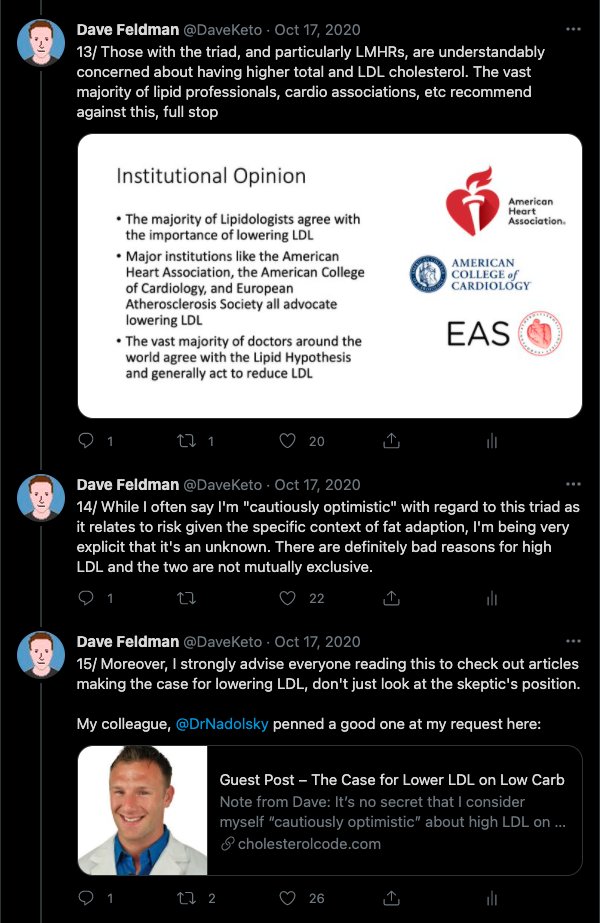
1/ Okay, finally getting around to this experiment video by @ScepticalDoctor
Naturally, this has many things I'm interested in -->
- N=1
- #Lipids (esp #Cholesterol)
- and not least of all, Anna and I have many respectful, kind debates (more of that plz, #NutritionTwitter)
Naturally, this has many things I'm interested in -->
- N=1
- #Lipids (esp #Cholesterol)
- and not least of all, Anna and I have many respectful, kind debates (more of that plz, #NutritionTwitter)
https://twitter.com/ScepticalDoctor/status/1437680040452444163
2/ "But this experiment is mainly for entertainment purposes. Self experiments like this are irrelevant from a scientific perspective."
Unsurprisingly, I do disagree on this wording. I think it's fair to say self-experiments have "limited" relevance (depending on design)...
Unsurprisingly, I do disagree on this wording. I think it's fair to say self-experiments have "limited" relevance (depending on design)...
3/ ... But a well designed N=1 can provide quite a lot of scientific value, even if primarily hypothesis-generating.
4/ I like the experiment protocol in having phases with a washout period in between. Plus 14 days for both the control and intervention phases allow for a fairly strong establishment period on each. 

5/ Trigs -
Baseline/Tofu/Washout/Eggs
50/52/60/57
Of course, I'm especially interested in this metric for many reasons. While TG can be "noisy", it can also say a lot where captured with frequency.
However, the deltas in absolute values are very low...
Baseline/Tofu/Washout/Eggs
50/52/60/57
Of course, I'm especially interested in this metric for many reasons. While TG can be "noisy", it can also say a lot where captured with frequency.
However, the deltas in absolute values are very low...
6/ As such while I wouldn't exactly call it a "draw" per se, I agree with her not assigning a lot of value to these levels in light of that high variability.
However, in this section she mentions she wasn't tracking calories -- and I do wish this were the case for the experiment
However, in this section she mentions she wasn't tracking calories -- and I do wish this were the case for the experiment
7/ Remaining metrics...
Baseline/Tofu/Washout/Eggs
Total Cholesterol
141/140/143/154
HDL-C
67/70/66/65
LDL-C
64/60/66/79
Non-HDL-C
74/70/77/89
Baseline/Tofu/Washout/Eggs
Total Cholesterol
141/140/143/154
HDL-C
67/70/66/65
LDL-C
64/60/66/79
Non-HDL-C
74/70/77/89
8/ So first, I want to reiterate that I very much appreciate @ScepticalDoctor's efforts in developing and executing this experiment. As I'm sure she'll agree, these kinds of things are very challenging to build your life around when going for not just days, but several weeks...
9/ While I have some comments and critiques, they are very much in the spirit of collaboration and curiosity.
First, I do think tracking quantities & calories is of high importance with experiments like these where margins of lipid changes in absolute levels are this small...
First, I do think tracking quantities & calories is of high importance with experiments like these where margins of lipid changes in absolute levels are this small...
10/ I'm intimately familiar with this challenge in particular given prior experiments, which has resulted in my being more obsessive than ever about exact weighing of food to ensure calorie matching, etc.
For example, see cholesterolcode.com/wp-content/upl… from my experiment last year
For example, see cholesterolcode.com/wp-content/upl… from my experiment last year
11/ It's tough, because we already can see just how much variability there is even over the course of the day wrt absolute values especially. Check out this data from my fasting window experiment and note these are actually mean averages per time point...
https://twitter.com/DaveKeto/status/1351904905972260865?s=20
12/ Another aspect worth nothing is the protein per calorie difference, but I'm not sure if I'd put a lot of stock into that one just yet.
What has occupied my attention more these days (in part, thanks to @ScepticalDoctor's experiments) is fiber...
What has occupied my attention more these days (in part, thanks to @ScepticalDoctor's experiments) is fiber...
13/ While I've long pointed to fiber as one component that is well known to have impacts on lipid levels, (see my reduction thread) I only more recently got into researching its net vs gross carb contribution.
I've been checking in with T1Ds on this too..
I've been checking in with T1Ds on this too..
https://twitter.com/DaveKeto/status/1437797820036050946?s=20
14/ The reason I'm especially interested in this comes back to the #LipidEnergyModel and possible insulinemic response. And while I don't have time to unpack the particulars, I'll just say it's motivated me to do an experiment soon where fiber is the isolated intervention.
15/ Again, I applaud @ScepticalDoctor for the experiment and making a video on its findings. I look forward to reading/watching what you'll be up to next. :)
• • •
Missing some Tweet in this thread? You can try to
force a refresh








